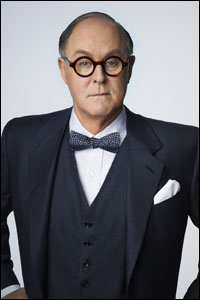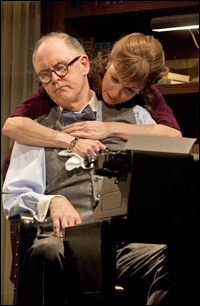
*
John Lithgow was a child during the Cold War, when Joseph Alsop, the man Lithgow is now portraying on Broadway in The Columnist, had sex with another man in a hotel room in Moscow. It was a set-up: Soviet agents photographed the encounter and then tried to blackmail Alsop, who was at the time one of the most influential newspaper columnists in the United States.
Lithgow was a teenager when, for just a few memorable seconds, he glimpsed John F. Kennedy at a campaign stop near Lithgow's childhood home in Ohio. "He just looked like he was made out of gold," the actor recalls. Joseph Alsop got a considerably longer and closer view; he was good friends with President Kennedy and even better friends with the First Lady.
Lithgow was an undergraduate participating in anti-war demonstrations when Alsop was fiercely defending the Vietnam War in column after column.
"I was not very aware of Alsop back then, but I was certainly alive during that era," says Lithgow, 66. "I feel like a consultant for the rest of the cast." The Columnist, the latest play by David Auburn (best known for Proof), acquaints a new generation with a powerful journalist and political commentator who was largely forgotten by the time he died in 1989. The ultimate Washington insider, Joseph Alsop used his access to produce a nationally syndicated column that was followed closely by political leaders and the public alike, starting in the Depression and ending during the Vietnam War. A self-declared New Deal liberal, he became one of the last of the Cold War warriors, a passionate hawk.
"I love playing someone so opposite from me," says Lithgow in his dressing room at the Samuel J. Friedman Theatre, where he daily dons a bowtie, owl-rimmed glasses and a superior attitude for his 21st role on Broadway. "And I love a play that's both an intimate character study and a look at a vast area of politics and society.
"Alsop's a man full of complexity. He's extremely arrogant yet extremely generous. He's downright cruel, yet he's got a great sense of humor. He's self-assured, but he has a huge secret: he's a closeted gay man.
"His apparent contradictions extend to his politics, too. He loved FDR. He was Eleanor Roosevelt's cousin. He considered himself a kingmaker of John Kennedy. But he also passionately defended [Secretary of Defense Robert] McNamara, Johnson, even Nixon.
"Any character who has that essential duality and tension is fascinating."
 |
||
| John Lithgow |
||
| photo by Andrew Eccles |
"But he was very much a Northeastern Brahmin; he had gone to Groton. I was a public school student."
He continues the comparison: "I studied in England" (on a Fulbright fellowship); "Joe was a pseudo-Englishman," affecting an accent. "And I have a beloved brother." Joe Alsop's brother Stewart collaborated on the newspaper column until 1958, when he broke away to become a magazine journalist. Joe loved Stewart but also tormented him, Lithgow says: "He threw a typewriter at him five times."
Joe's relationship with Stewart (played by Boyd Gaines) is one of several depicted in Auburn's play, which spans the years 1954 to 1968. The others are with his wife (played by Margaret Colin in "a marriage of convenience"), his stepdaughter (Grace Gummer) and the antiwar journalist David Halberstam (Stephen Kunken).
Then there is the relationship with the man from Moscow. "It was known that Joe Alsop was entrapped," Lithgow says. "But it's a dramatization. David's play is hypothetical non-fiction."
 |
||
| John Lithgow and Margaret Colin in The Columnist. |
||
| Photo by Joan Marcus |
Those who knew his background may not have been very surprised: Lithgow's father, Arthur, was a theatre professor, producer and director who cast his youngest son in his productions from an early age.
In a widely varied career that has lasted just about as long as the career Alsop had as a columnist, Lithgow, probably best known as the alien High Commander on TV's "3rd Rock from the Sun," has played a journalist four times.
"They're great characters," he says. Here, too, there are similarities. "Both entertainers and journalists live on adrenaline," says the entertainer playing a journalist. "And everybody is always saying that both theatre and newspapers are dying. Theatre will never die. Neither will journalism."
The old Royal typewriter he uses in The Columnist just might, though. "You can't afford to have the keys stick when you're performing a scene," says Lithgow, "so I've been practicing."










